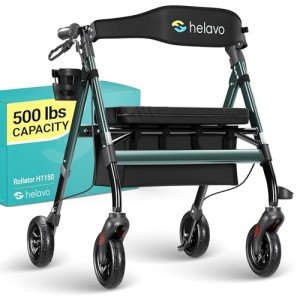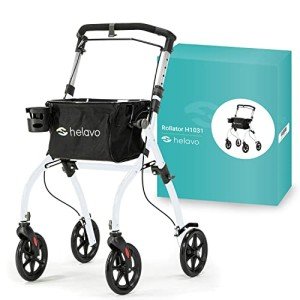Guide To Senior Walker: The Intermediate Guide The Steps To Senior Wal…
페이지 정보
작성자 Catharine 작성일 25-09-24 03:28 조회 2 댓글 0본문
A Comprehensive Guide to Medical Walkers: Enhancing Mobility and Independence
In the realm of healthcare, mobility plays an essential function in rehab and overall well-being, especially for seniors and those recuperating from injuries. Amongst the myriad of mobility help offered today, medical walkers stand out as flexible tools that assist in motion and enhance self-reliance. This post will dig into the types, advantages, factors to consider, and FAQs relating to medical walkers.
What is a Medical Walker?
A medical walker, typically referred to as a walking frame, is a supportive gadget designed to help people with mobility challenges walk with higher stability and ease. Walkers supply a broader base of support compared to walking sticks and crutches, making them ideal for those with balance problems or minimal strength.
Kinds Of Medical Walkers
| Type | Description | Features |
|---|---|---|
| Standard Walker | A basic four-legged frame without wheels, used mainly for stability. | Lightweight, durable, adjustable height, suitable for indoor and outdoor use. |
| Wheeled Walker (Advanced Rollator Technology) | A walker with wheels on the front legs, permitting much easier motion. | Geared up with hand brakes, a seat for resting, and storage alternatives. |
| Hemi Senior Walker | A walker created for people who can use one arm and need support. | Lightweight and compact, features a curved deal with for much easier gripping. |
| Bariatric Walker | Designed for bigger individuals, using increased weight capability and stability. | Boosted durability, larger frame, and supportive features for heavier users. |
| Knee Walker | An unique alternative for those with leg injuries, permitting them to rest the knee. | A platform to support the injured leg, guiding abilities, and brakes. |
Advantages of Using a Medical Walker
- Enhanced Stability: Walkers provide additional points of contact with the ground, leading to a more stable walking experience.
- Increased Independence: Users can navigate their environment without needing assistance, improving self-confidence and self-reliance.
- Improved Safety: The threat of falls is considerably minimized, as walkers use support to those with balance concerns.
- Versatile Usage: Many walkers are designed for both indoor and outdoor usage, adapting to numerous terrains.
- Assistance throughout Rehabilitation: Medical walkers are important throughout healing from surgeries, injuries, or illnesses.
Factors to consider When Choosing a Medical Walker
When picking a medical Modern Walker, numerous factors need to be kept in mind:

| Consideration | Description |
|---|---|
| User's Condition | Assess the individual's strength, coordination, and specific needs. |
| Devices Weight | Guarantee the walker is lightweight enough for easy handling however sturdy enough for support. |
| Adjustable Height | The walker ought to be adjustable to fit the user's height for optimal convenience and functionality. |
| Hand Grip Comfort | Inspect that the grips are comfortable to hold for prolonged durations. |
| Weight Capacity | Make sure the walker can support the user's weight, particularly for bariatric walkers. |
| Storage Needs | Figure out if extra features like baskets or trays are essential for carrying products. |
Often Asked Questions (FAQs)
How do I figure out if I need a walker?If you experience difficulty in maintaining balance, feel unsteady walking, or need assistance on flat surfaces or inclines, it's advisable to speak with a healthcare professional for an assessment. Can I utilize a walker outdoors?Yes, specially created
walkers with larger wheels(wheeled walkers or rollators)appropriate for outdoor usage and can manage various terrains effectively. How do I preserve my walker?Regularly inspect the walker for loose parts, make sure wheels are lubricated if
appropriate, and clean it as required. Consult
the maker's guidelines for particular upkeep directions. Are walkers covered by insurance?Many insurance coverage plans offer protection for walkers, however it is vital to examine with your supplier to understand your particular policy
information. Can a walker assistance with physical therapy?Yes, using
a walker can support rehabilitation efforts by providing stability throughout exercises suggested by physiotherapists. Medical walkers are important tools that not
just facilitate movement and self-reliance however likewise significantly improve the quality of life for individuals facing mobility difficulties. With different types offered, selecting the right walker is
important to satisfying private requirements. The journey to gaining back mobility can be difficult, but with the right devices and support, people can get rid of barriers and recover their self-reliance. By comprehending the types of walkers, their advantages, and important factors to consider, users can make educated choices-- leading to a much safer, more positive way of moving through life. Whether it's a Premium Rollator Walker for outdoor experiences or a basic walker for indoor navigation, the right walker can open doors to newly found flexibility and improvement in life.
- 이전글 Buy A Driver's License Without Advance Payment: The Good, The Bad, And The Ugly
- 다음글 Five Killer Quora Answers To Robot Hoover And Mop
댓글목록 0
등록된 댓글이 없습니다.